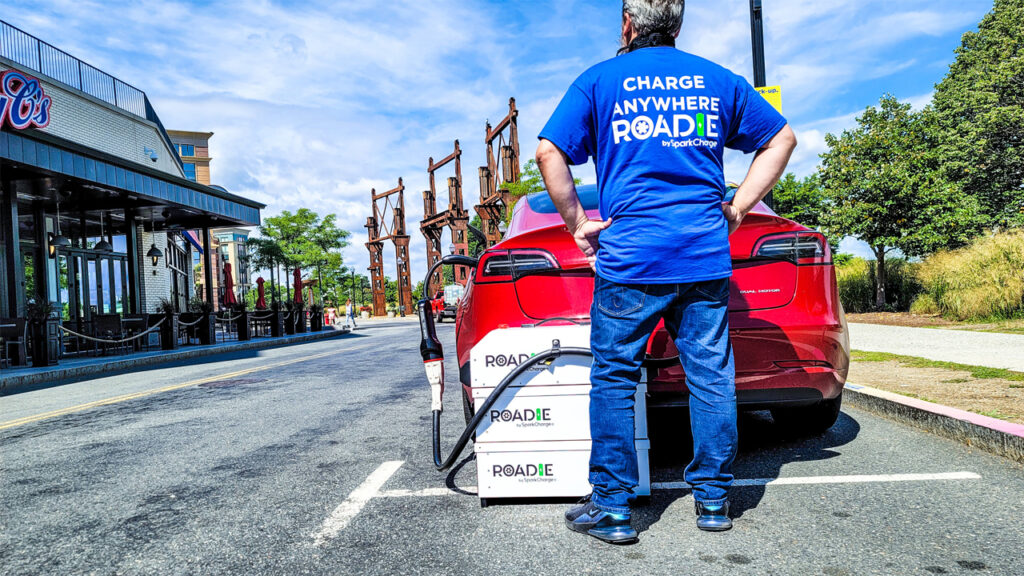SparkCharge: Success Story
The future of EV charging is portable.

Portable, powerful, profitable
Creating an on-demand charging infrastructure for electric vehicle owners
Electric vehicles have started to become increasingly popular in the United States as the impacts of climate change become part of daily life. However, infrastructure and capacity to maintain sufficient charge has not kept up, with charging stations for electric vehicles (EV) few and far between. This is a significant barrier to scale for the EV industry despite its recent boom, and the SparkCharge team is leading the charge to change that.
SparkCharge recently came away with a one million dollar investment on the season premiere of ABC-TV show Shark Tank. Mark Cuban and Lori Greiner teamed up to accept their offer. This is a great victory for the company, and a huge win for clean tech. Josh Aviv, co-founder and CEO, said “Being on Shark Tank is every entrepreneur’s dream….This success means a lot to our company, but really means even more for the electric vehicle industry.” This success has been a dream come true for the SparkCharge team after a remarkable three years of product development.
SparkCharge’s impact: a high speed ramp to portable EV charging
In 2017, Josh Aviv experienced this frustration of not having access to a charger when driving his EV. He decided to change this by building what has now become the Roadie, SparkCharge’s mobile, scalable, and intelligent EV charging infrastructure. What makes this charger unique is its portability, as it can fit in the back of any car, and its modularity. Their brand new modularity technology allows the portable chargers to be stacked on top of each other to deliver up to 60 miles of range at a rate of 1 mile every 60 seconds, and charges up to 8 times faster than most wired chargers. This unique advantage makes EV charging easy and convenient. Creating such a disruptive and game-changing product in less than 3 years is truly an impressive feat – the team describes it as “not just a new product, but a completely new concept.” In order to create such an innovative product, SparkCharge focused on hiring a small and especially efficient team. JR Rapoza, Vice President of Marketing & Communications at SparkCharge, emphasized that the whole team “bleed[s] SparkCharge Blue”.
FORGE impact: local supply chain
In an effort to iterate quickly and effectively, SparkCharge reached out to the FORGE team with several specific manufacturing needs that they wanted to source locally. Their main needs included printed circuit boards, rapid prototyping and sourcing, as well as supply chain management. FORGE connected them with Strategic Sourcing Dynamics, a supply chain consultancy firm, for help with supply chain management with PCBA and sheet metal businesses.
FORGE also identified two other suppliers, Alternative Manufacturing Inc (AMI) and Colonial Electronics Manufacturers. They used their connection to AMI for rapid prototyping of circuit boards, and through Colonial Electronics Manufacturers, they were able to get their pilot PCBAs. More recently, the FORGE team connected SparkCharge with Intertek, who will be helping with UL and ETL testing, both crucial certifications for many IoT and wireless devices. After working with multiple FORGE network suppliers, SparkCharge was able to shift their focus to software development, and recently released an app called BoostEV. The app allows any EV driver to request charge delivery wherever they are, creating charging freedom and another win for EV infrastructure.
Michael Cummings, Chief Operations Officer at SparkCharge, advises startups to meet face to face with their supply chain. He emphasizes that “There are benefits to making it locally. It’s much faster and easier to have manufacturers close by during the development process, especially during prototyping.” Throughout this process of working together, SparkCharge has remained a valuable company in the FORGE network, and we look forward to seeing them continue to disrupt the EV industry for years to come.
